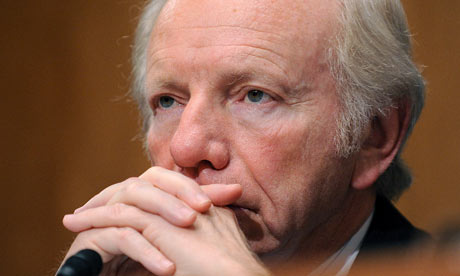WikiLeaks cables visualisation pulled after pressure from Joe Lieberman
US company Tableau Software admits request from senator made it withdraw graphics while Social Security Agency warns staff viewing cables could be 'criminal offence'

The removal of the visualisation came as the US Social Security Agency warned its workers that looking at the leaked cables could constitute a criminal offence.
Writing on the blog for Tableau Software, which offers free public visualisations for data, Elissa Fink writes that
"Our terms of service require that people using Tableau Public do not upload, post, email, transmit or otherwise make available any content that they do not have the right to make available. Furthermore, if we receive a complaint about a particular set of data, we retain the right to investigate the situation and remove any offending data, if necessary."She adds:
"Our decision to remove the data from our servers came in response to a public request by Senator Joe Lieberman, who chairs the Senate Homeland Security Committee, when he called for organisations hosting WikiLeaks to terminate their relationship with the website."Lieberman, an independent senator who was re-elected in 2006 but is seen as close to the Democrats, persuaded Amazon to stop hosting the Wikileaks site on Wednesday. He said then that "[Amazon's] decision to cut off WikiLeaks now is the right decision and should set the standard for other companies WikiLeaks is using to distribute its illegally seized material. I call on any other company or organisation that is hosting WikiLeaks to immediately terminate its relationship with them."
At Tableau, Fliss said: "This will inevitably be met with mixed reaction. However, our terms of service were created to ensure responsible use of data."
But as with the US diplomatic cables data, which have now spread so far that they can easily be downloaded from Google or via the file-sharing service Bittorrent, the Tableau visualisations - and the blogpost for it - are still easily found on the net. Google's cache of the post from Tableau Software shows that the company was apparently untroubled on 28 November by its use: it included a copy of the visualisation that was created by Wikileaks, and acknowledged that "the release is controversial because the US government has strongly discouraged it". The issue of whether Wikileaks had the right to make the content available does not seem to have occurred to them at the time.
Comments on the Tableau post are generally against the decision: one says "thank you for making it easy to never use your software again. Companies who are unwilling to support free speech do not receive my support", while another asks "what if something even more interesting was found in the data through the interactive nature of your site, or what if it brought awareness to a particular data point that was public but obscured? I'm saddened to see that Tableau is not principled enough to explore new and interesting data."
Meanwhile the Social Security Agency has warned its employees about the dangers to staff of reading the cables:
"Earlier this year a large amount of United States government classified information was illegally released to the public website WIKILEAKS [sic]. The documents on WIKILEAKS could place military personnel and United States supporters in Iraq and Afghanistan at an increased risk of harm.
"Despite these documents being publicly accessible over the internet, the documents remain classified and SSA employees should not access, download, or transmit them. Individuals may be subject to applicable federal criminal statutes for unlawful access to or transmission of classified information."Lieberman's official page has not been updated to reflect his latest victory in trying to remove the leaked US embassy cables from the internet. But future WikiLeaks hosts may be more difficult to dissuade: the latest hosting service, Bahnhof, is centred in a bunker in Sweden.
Whether US companies will worry about the threat of Lieberman - and other politicians in and out of government - if they are asked to help out with future leaks remains to be seen.
James Ball, who created the visualisation, told the Guardian: "The Cablegate graphs Tableau pulled from their servers contained no information directly from US data. They gave indications of cables from each country, classifications, and subject tags (such as IMF, human rights or economic issue) - exactly like graphics published in print and online by the Guardian.
"The graphics could be easily reproduced using nothing more than data the Guardian has published on datastore. To pull these graphics - which had received over 2.4m visitors - merely because the Wikileaks website links to them; and a US senator issued a public (not private) complaint - smacks of cowardice and blind censorship.
"What makes it especially disappointing is Tableau had previously used user-generated graphics from the Afghan War Logs (by @rasga) in its customer mailout - and even blogged and tweeted when Wikileaks first linked to my Tableau graphics."
